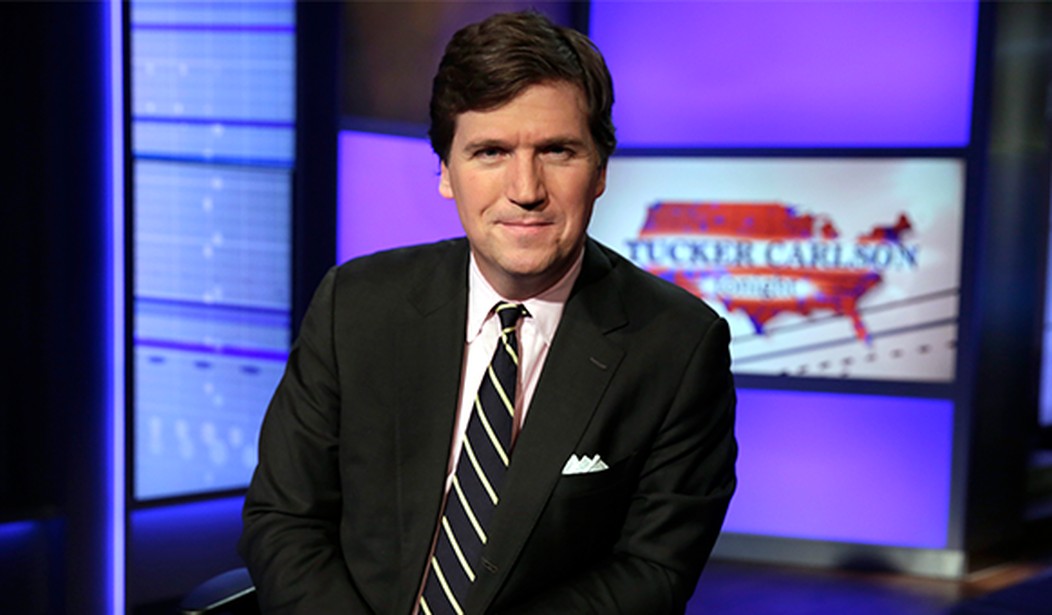Tucker Carlson is making waves in the political news cycle once again, this time for a comment he made about MSNBC anchor Chris Hayes on his Fox News television show.
“Chris Hayes is what every man would be if feminists ever achieved absolute power in this country,” Carlson said on Monday, “apologetic, bespectacled and deeply, deeply concerned about global warming and the patriarchal systems that cause it.”
Carlson has also treated his counterparts at CNN with no less contempt in recent weeks, often in his famed and fiery monologues. He’s referred to Brian Stelter as a “palace eunuch” and CNN CEO Jeff Zucker’s “marionette”, and purposely mispronounced Don Lemon’s name as “Don Lé-mon.”
One can’t help but conjecture that Carlson might single-handedly provide a renaissance in political branding. Trump’s nicknames, while oftentimes humorous, sometimes lack the sharp bite of the trained wordsmith. Trump’s most recent appellation—“Pencil Neck Adam Schiff”— might stick on his campaign merchandise, but there’s no guarantee that it possesses the half-life of more memorable jibes from the 2016 campaign (the success of “Crooked Hillary” and “Lyin’ Ted” appear nearly un-reproduceable.)
Why shouldn’t we expect “eunuch” to become a household insult, displacing that much-overused term “cuck” (derived from the English, “cuckold”)? And what’s wrong with the resurgence of “marionette” at the expense of that trite label “puppet”, even if people have to use google upon hearing it?
Recommended
And contrary to the griping of some pundits bemoaning the decay of “civility”, invective is a time-honored tradition in the political, artistic, and philosophical realms.
The Founding Fathers—universally esteemed for their intellectual prowess and literary eloquence—were not above stooping low and rolling in the mud of name-calling. In the election of 1800 old comrades-in-arms-turned-political-enemies Thomas Jefferson and John Adams traded barbs unlike anything seen in modern times: Jefferson’s team fingered Adams as a “hideous hermaphroditical character, which has neither the force and firmness of a man, nor the gentleness and sensibility of a woman,” while Adam’s supporters called Jefferson “a mean-spirited, low-lived fellow, the son of a half-breed Indian squaw, sired by a Virginia mulatto father.”
The famously eccentric American expatriate artist James Abbott McNiell Whistler picked so many a fight with his critics in the art world that instead of “going high” as Michelle Obama famously recommended, he went as low as possible. In 1890 the first edition of Whistler’s The Gentle Art of Making Enemies appeared, consisting of a collection of all the insulting letters and articles that had been published about Whistler—and his brutal responses.
Even the nineteenth-century German philosopher Friedrich Nietzsche indulged in invective. On the Genealogy of Morality, his magnum opus, is subtitled, “A Polemic” and rife with ad hominem attacks against European Christianity. (“Judeo-Christian”, a term he coined and which is now in vogue among American conservatives, was no compliment but an insult; for centuries Jews and Christians held a mutual animosity toward one another.)
Even Nietzsche’s 1873 essay on contemporary theologian David Strauss was so virulently polemical that Strauss, who never met the philosopher in is lifetime, is said to have remarked in a letter to a friend, “First they draw and quarter you, then they hang you. The only thing I find interesting is the psychological point–how one can get into such a rage with a person whose path one has never crossed, in brief, the real motive of his passionate hatred.”
Nietzsche, for his part, wrote upon hearing of the death of Strauss, “I hope very much that I did not sadden his last months, and that he died without knowing anything about me. It’s rather on my mind”. Clearly, Nietzsche’s polemical style wasn’t born of a personal animus, but merely technique.
While it might indeed be the case that Carlson and Trump’s attacks are fueled by a strong dislike of the people they ridicule, this doesn’t change the fact that insults are a valid means of countering one’s political opponents, especially when they veer into satire. Carlson’s monologues are not just meant to humiliate—they’re meant to poke fun at and deflate self-important people whom Carlson believes are ultimately dishonest or alarmist. If, as George Orwell once said, “every joke is a tiny revolution,” then every nickname is one step in the process of overthrowing those who engage in lying, pomposity, and groupthink.
In short, any claim that Carlson or Trump represents a heretofore unseen vulgarizing of the public discourse is simply untrue; rather than an aberration, they represent a return to normalcy. We should be thankful politics is rapidly becoming a far more colorful—and honest—place with this newfound free-flow of invective.

























Join the conversation as a VIP Member